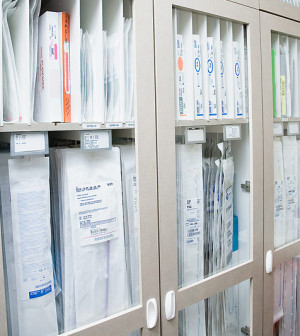- 8 Ways to Increase Dopamine Naturally
- 7 Best Breads for Maintaining Stable Blood Sugar
- Gelatin vs. Collagen: Which is Best for Skin, Nails, and Joints?
- The Long-Term Effects of Daily Turmeric Supplements on Liver Health
- Could Your Grocery Store Meat Be Causing Recurring UTIs?
- Are You Making This Expensive Thermostat Error This Winter?
- Recognizing the Signs of Hypothyroidism
- 10 Strategies to Overcome Insomnia
- Could Artificial Sweeteners Be Aging the Brain Faster?
- Techniques for Soothing Your Nervous System
Poor Patients Might Benefit From Trained Helpers After Hospital Discharge

Poorer patients do better after leaving the hospital if they receive help from specially trained laypeople known as community health workers, a new study finds.
“Hospitals have been challenged to transform into comprehensive health systems capable of responding to acute illness with proactive, patient-centered and community-based care. This study may help inform health systems as they redesign their workforces and care practices to achieve this goal,” said Dr. Shreya Kangovi, of the University of Pennsylvania Perelman School of Medicine, and colleagues.
Researchers looked at nearly 450 hospitalized patients in the United States who had low incomes and were uninsured or covered by Medicaid, the tax-supported insurance program. About half of the patients worked with community health workers to develop an action plan to help them stay healthy after discharge, while the other patients were placed in a control group that received usual care.
The community health workers encouraged patients to schedule and attend medical appointments after they left the hospital, and even offered to accompany them to their first appointment. The workers helped patients for at least two weeks after they left the hospital.
Compared to those who received no assistance, the patients who were assisted by community care workers were more likely to get follow-up primary care within 14 days after leaving the hospital (60 percent vs. 48 percent) and less likely to be readmitted to the hospital within 30 days (about 2 percent vs. 5.5 percent).
Patients who were supported by community care workers were also more likely to receive high-quality discharge information when leaving the hospital and to have greater improvements in mental health, according to the study published online Feb. 10 in the journal JAMA Internal Medicine.
There were no differences between the two patient groups in terms of physical health improvements, satisfaction with medical care or with taking medications as prescribed.
More information
The U.S. Agency for Healthcare Research and Quality has more about patient safety after hospital discharge.
Source: HealthDay
Copyright © 2026 HealthDay. All rights reserved.










